The training was held as part of a workshop meeting of the Central Club of Young Teachers (CKMN, Centralny Klub Młodego Nauczyciela) of the Polish Teachers’ Union (ZNP, Związek Nauczycielstwa Polskiego). The event was held on April 11-12, 2024 in Warsaw, Poland. The CKMN brings together young teachers up to age 35 from different parts of Poland; as part of its activities, it organizes training, seminars, debates, and conferences during which young teachers and educators exchange best practices and experiences gained in working with students.
My training, „How do we face and deal with radical populism?” took place at the end of the second day of the CKMN meeting in Warsaw. The first day and half of the second day of the training was devoted to organizational and internal affairs of the CKMN and planning activities for 2024. As a trainer, I was not responsible for recruiting the group, as CKMN has its members. I have discussed the date and topic of the training with the chairman of the board of CKMN ZNP, Szymon Lepper, who is also a Eurotrainer. Szymon gave me the email addresses of the training participants so I could gain more information about their work experience and contact information with radical populism in the workplace.
The training aimed to supply young teachers and educators with knowledge regarding models of how radical populism operates in Europe, the peculiarities of political radicalism, and forms of response, both from a teacher and staff perspective. Special attention was paid to teachers’ reactions to possible behavior of students in and out of the classroom. I was the originator of the training topic and the methods used. I consulted the scenario with my coach for the Eurotrainers accreditation, Colin Nolan. The timeliness of the training topic is related to the April 7 local elections in Poland, which were won nationally by the populist-right Law and Justice party (PiS, Prawo i Sprawiedliwość), while the far-right Confederation (Konfederacja) came in fourth place. An additional training context is the European Parliament elections, which were held in Poland on June 9, 2024. As a rule, during the European campaign, radically populist parties used their anti-refugee, xenophobic, and anti-European narrative to attack the European Union. I found the timing regarding training in dealing with extreme populist content perfectly appropriate. Radical right-wing populism has become one of the world’s leading political issues since Brexit and Donald Trump’s first victory in the 2016 US presidential election. In 2024, the far-right’s electoral successes in Europe put the training topic well into political reality. My additional role as a trainer was to bring the political attention to young unionized teachers that we have to react and fight the radical populists. Xenophobic and nationalistic agenda – as history taught us – is a vital threat to democracy and human rights.
At the beginning of the training, I introduced myself and briefly discussed the activities. Then, I asked the participants to move to a larger room, where I used the spider web method as an energizer. Using a ball of wool, I asked them to throw it to a person of their choice, while the person who caught it was asked to introduce themselves and identify one word they associated with radical populism.
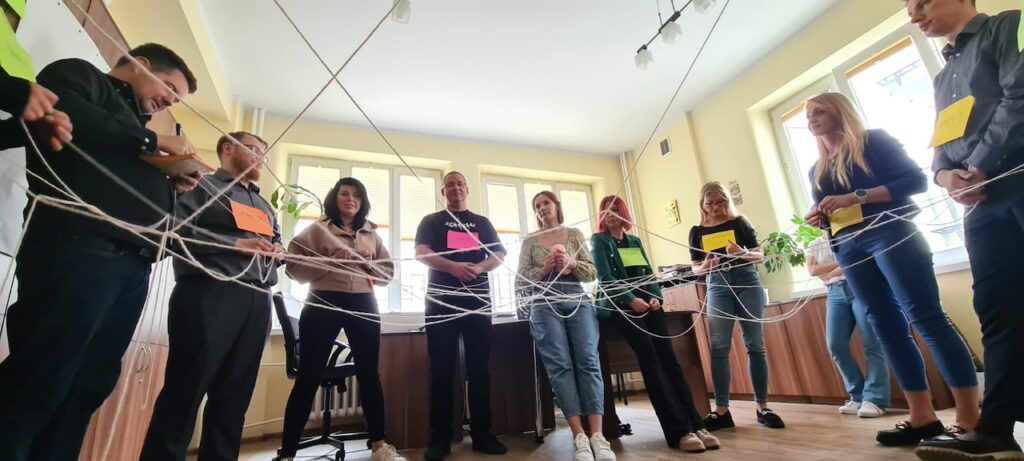
After each participant had a piece of colored paper with their association, I asked them to group their answers into categories individually. As a trainer, I did not impose my opinion; I answered questions and cleared trainees’ doubts. Participants decided to form three groups related to nation/people, politics, and characteristics of radical populism. In the next step, we briefly discussed why the CKMN members made such groupings rather than others.

The second part of the training involved embedding the first associations of radical populism with existing academic and theoretical frameworks. I recalled the recognized Polish researchers of radical populism, Mirosław Karwat’s and Andrzej Ciążela’s definitions that draw attention to the relationship of populism with the emotional reflexes of large communities, prejudice, social obsessions, and radical argumentation.
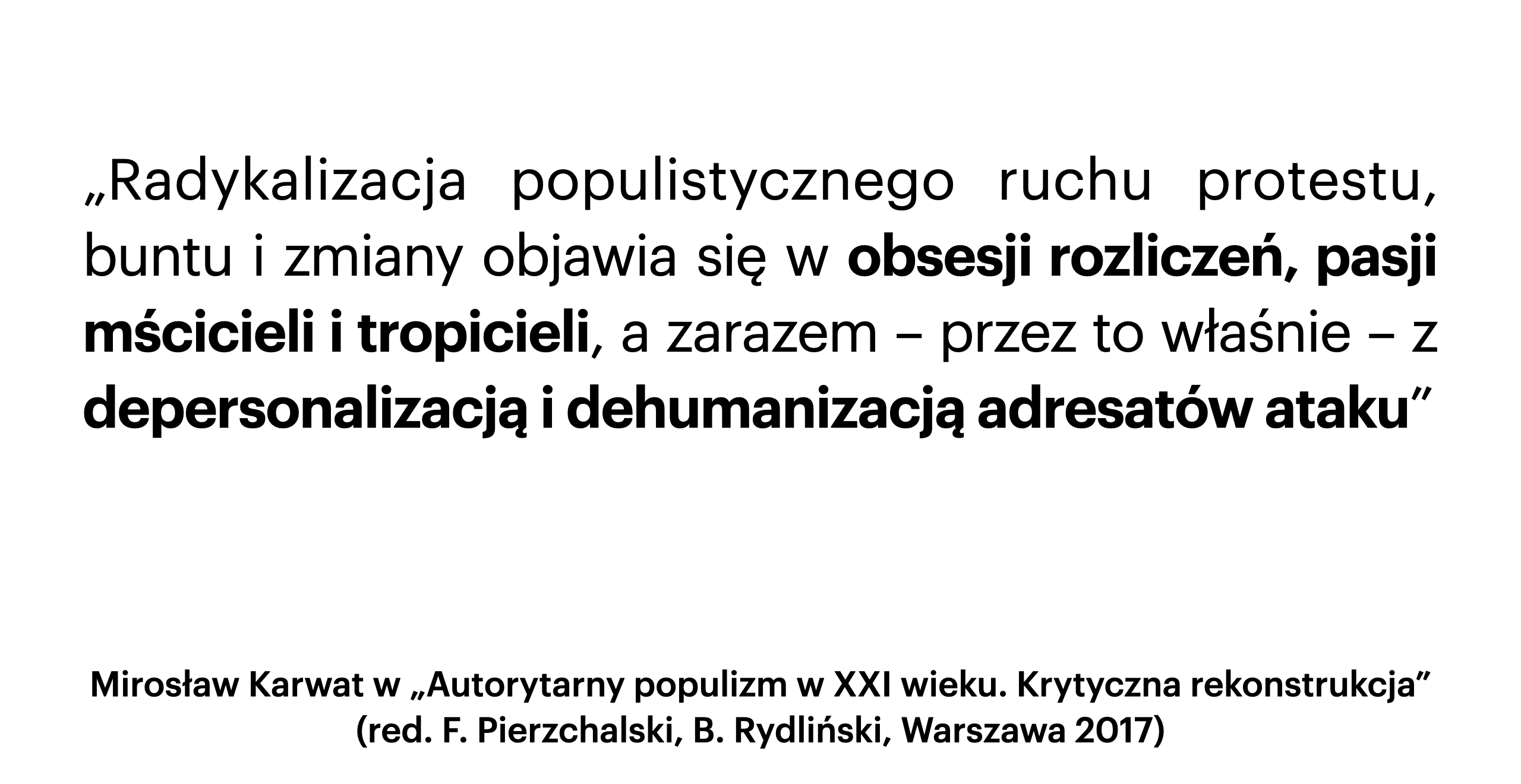
I gave the examples from Polish political life that exemplify radical populism, after which I announced the central part of the training, i.e., working in groups according to the World Café method. I’ve divided three groups and three reporters of each sub-table.
During the theoretical introduction, I referred to the existing literature on the subject, including the results of research conducted by Daphne Halikiopoulou and Tim Vlandas, published in a report titled “Understanding right-wing populism and what to do about it”. Then, I moved from the European perspective to the national aspect.
I then showed all participants three examples of far-right statements by Confederation politicians:
- Sławomir Mentzen, saying that the party’s program is anti-Semitism, homophobia, libertarianism, and dislike of the European Union,
- Grzegorz Braun, who advocated the whipping of homosexuals,
- Janusz Korwin-Mikke, claiming that a consensual woman should not have an abortion after becoming pregnant as a result of rape but should sell the child on the open market.
Group „1” received Slawomir Mentzen for analysis, the group „2” received Grzegorz Braun, and the group „3” received Janusz Korwin-Mikke. The mentioned statements were written on a separate sheet of paper on a flipchart. The participants were tasked with preparing their potential response and their reactions as teachers if one of their students were to spread or popularize the analyzed examples of extreme statements in their peer group.
I then showed all participants three examples of far-right statements by Confederation politicians:
Each group worked in a separate room, as there was no suitable sizeable single room at the training site. The participants selected group reporters voluntarily. Each round of World Café was 20 minutes, then the groups moved on to the following rooms in the following order: „1” to „2”, „2” to „3”, „3” to „1”. After two passes, all groups analyzed all three populist and extreme statements made by politicians of Konfederacja.
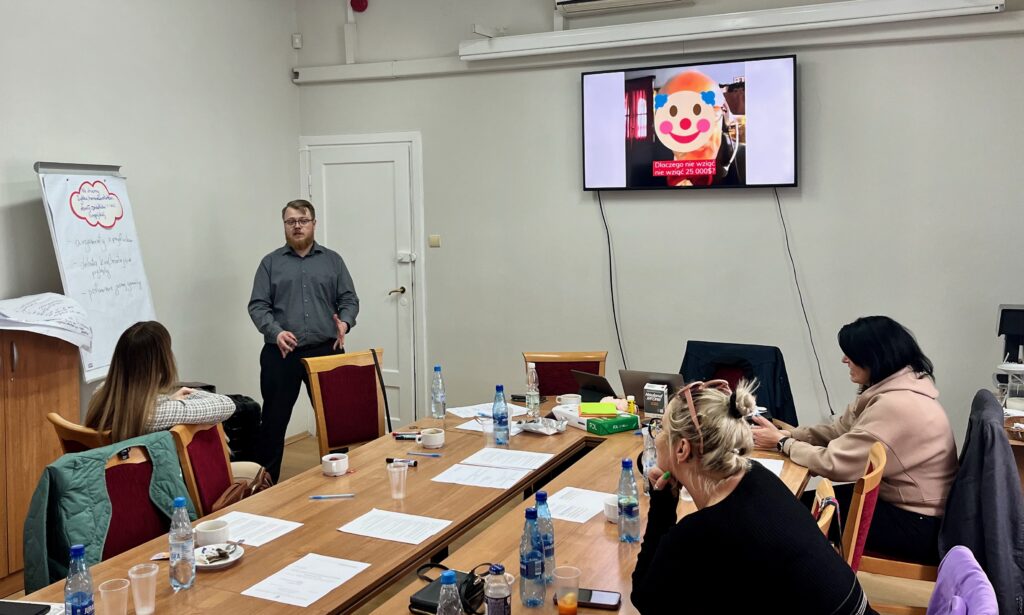
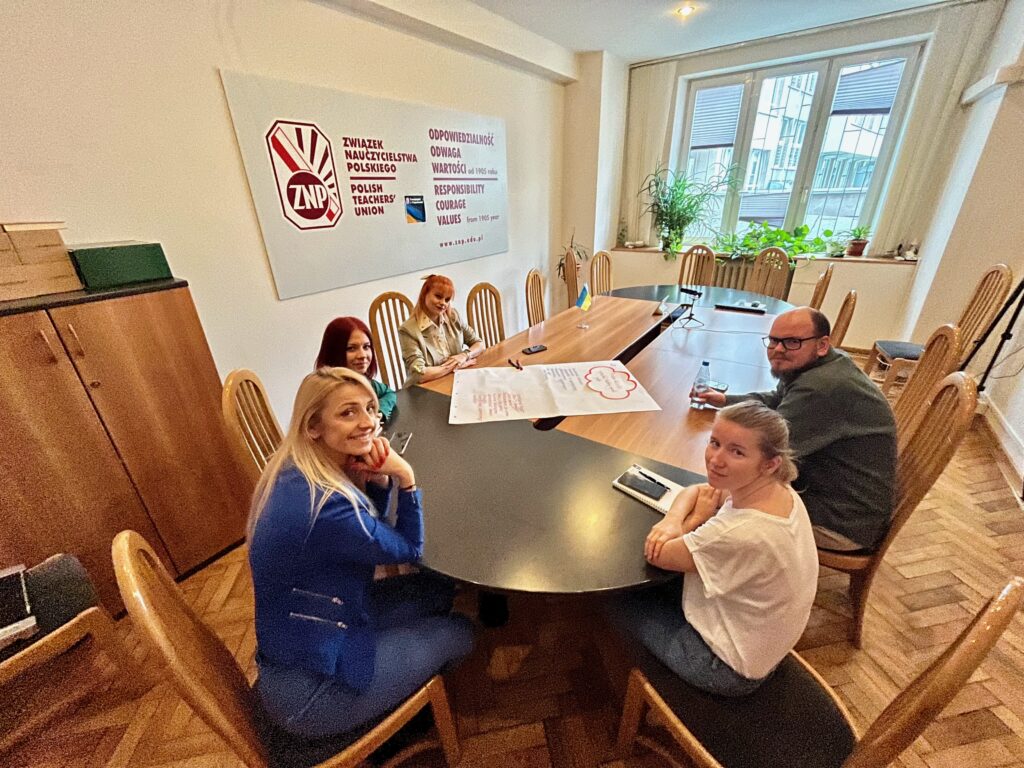
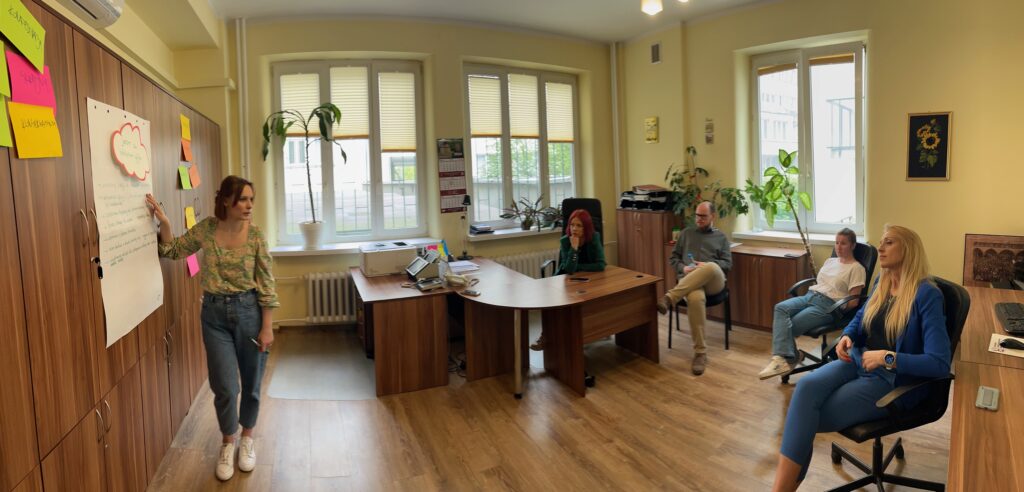
After working in groups, which took one hour, I invited all trainees to the largest room, where we could glue flipcharts with the results of their work. Together with the reporters, we summarized their work. Together with all the participants, we discussed the forms of their potential reaction during the class, in which the students would promote the statements of politicians of the populist and xenophobic right. At the very end of this part of the training, I made a short, five-minute expert commentary drawing attention to the ethical dimension of ZNP’s response to the homophobic, anti-Semitic, or racist language of some politicians appearing in the Polish public debate.

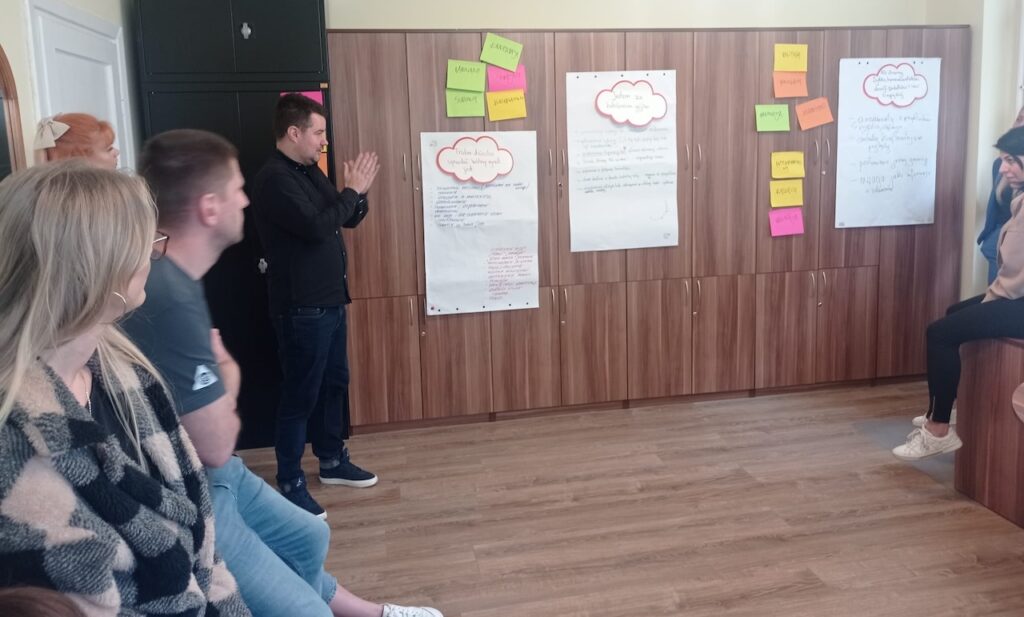
Post-training reflection
Training young teachers on dealing with radical populism has been one of the most rewarding forms of my involvement as a union member, trainer, and academic researcher on authoritarian and far-right parties and movements. During the training described here, I translated my expert knowledge into concrete recommendations for pre-service, elementary, and secondary school teachers.
The first challenge I faced was that I was previously unfamiliar with the Central Club of Young Teachers (CKMN) members. In my activities in the ZNP, I do not have daily contact with school teachers. The Council for Higher Education and Science of the ZNP brings together academics who lecture and conduct research at universities, generally those with academic degrees. At the beginning of the training, I had the impression that those attending the training needed to be more trusting, knowing that a doctor of social sciences would conduct the training. With the help of a questionnaire sent out before the training, I was able to obtain some necessary information about the participants, such as what level of education they teach, what classes they teach, what knowledge they have of radical populism, and whether they have encountered extreme attitudes among their students and in the workplace. This information allowed me to match the training to the profile of those being trained.
An additional problem I had to face during the training I conducted was that this was the last part of the two-day CKMN meeting. Evidently, the participants were already tired from the hours of discussions preceding our activity. Their luggage was already in the activity room, which was also a symbolic barrier. In other words, the participants knew that immediately after our training, they would be going to lunch, after which they would all disperse to their hometowns around the country. A thing that was additionally out of my control was the training infrastructure itself. The room where the central CKMN meeting was held was too small for the activity I had planned. Thanks to Szymon Lepper, however, I had two additional rooms for smaller groups to work in. The largest room was the large office of the ZNP Central Committee staff, who were away from work on Friday, the day of the training. The energizer was conducted using the spider web method; however, it was done in less than optimal conditions and was close to the desks and chairs of the ZNP employees. One of the rooms where CKMN members worked was a small conference room directly adjacent to the office of the chairman of ZNP’s Central Committee, Slawomir Broniarz. Some of the trainees may have felt some pressure from the fact that the leader of our, Poland’s most prominent teachers’ union, was in office behind the wall.
The biggest challenge during the training turned out to be an argument between participants in one of the World Café groups. The dispute was over a proposed response to students’ potential spreading of homophobic and anti-Semitic content. One person argued that such a pupil should receive a negative and written reprimand, while the other fundamentally disagreed, saying that punishment is an outdated and ineffective form of learning. As a result of this exchange of views, the two sides began to bid on who had been working in schools longer and what powers and roles they had in their schools. This quarrel occurred when I entered the room of the group mentioned above, checking how their work and the preparation of joint proposals were going. Seeing the emotional tone of both sides’ statements, I intervened, asking for calm and individual statements so that everyone’s arguments could resonate with the group. As mentioned earlier, the dispute also returned during the debriefing among all trainees at the end of the work in the World Café format. I reacted similarly by asking for brief statements from each side. Most CKMN members agreed that a better way to deal with a situation where a student promotes extreme content is to talk rather than punish. To keep the discussion from focusing solely on this aspect, I took the floor, pointing out that talking may be a better solution based on verifying or „fact-checking” extreme claims rather than providing unconditional space to spread hateful populist content. After that, we moved on to analyze further the recommendations proposed by the following groups.
The last difficulty I noticed during the training was the lack of experience of the trainees with political education. Despite the high level of involvement of CKMN members, I had the impression that they did not fully recognize the threat posed by the growing popularity of radical, right-wing populism in Poland and Europe. One could perceive a lack of knowledge of the history of the ZNP itself, including that in the past, the extreme right attacked members of this union and that they were victims of German Nazi terror. Unfortunately, the trainees did not know that ZNP is a union that actively opposes xenophobic, homophobic, racist, and anti-Semitic attitudes. As a result, some of the group work results could have been more specific and specific. Therefore, after the presentation of the work in the groups, I made a brief three-minute summary in which I made a point about the anti-fascist legacy of the ZNP and that in both union and teacher work, impassable red lines should be drawn, which should be met with a firm response. I sensitized that one should react quickly and concretely because, as Holocaust survivor Marian Turski pointed out, “Auschwitz did not fall from the sky, but stomped on, treading small steps, coming closer”.
In the future, it would be crucial to continue to train participants in my training and recruit new participants to counter radical populism. As ZNP enrolls new members, the union should continuously provide political education, as we are witnessing the rise of radical populist forces globally. I also recommend creating a base of members participating in general and specialized training. ZNP and the European Trade Union Committee for Education (ETUCE) should develop a network of trainers specializing in far-right counterinsurgency topics. By that, such group can learn from each other, share know-how, experience, and knowledge, and create a sense of common trade union goal